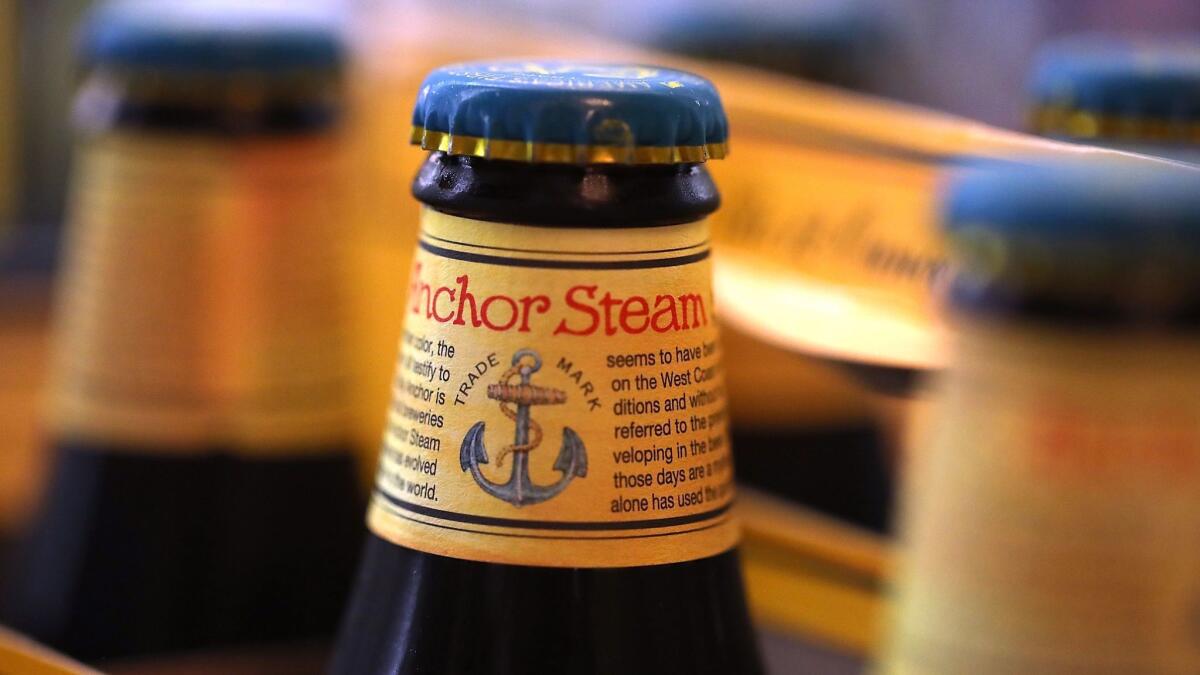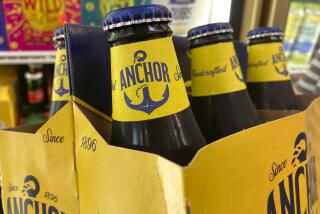San Francisco’s Anchor Brewing acquired by Sapporo

- Share via
Anchor Brewing has been a San Francisco staple since 1896, surviving earthquakes, prohibition and tech booms and busts. But on Thursday, the brewer announced it will be a San Francisco company no longer after a sale to Japan’s Sapporo Holdings Ltd.
Exact terms of the deal were not disclosed, but a spokesman for Sapporo said the price was approximately $85 million.
For the record:
8:27 p.m. Jan. 30, 2025A previous version of this article said a spokesman for Anchor said the sale price was about $85 million. That figure came from a spokesman for Sapporo.
The deal marks the latest California brewery to be acquired by a larger beer maker. It comes amid rising competition among craft breweries — a sector of the beer industry that Anchor has been credited, by some, for helping inspire.
“We have been evaluating the future for some time and recognizing the challenges in craft breweries and the number of breweries that have come to the market, we felt we needed to have a stronger partner to achieve our long-term goals,” said Anchor co-owner Keith Greggor.
Anchor will not lay off employees as part of the sale, and its beers will continue to be brewed at its headquarters in San Francisco’s Potrero Hill neighborhood. The company plans to open a taproom across the street.
It took Greggor 18 months to find a buyer that met his criteria: respect for Anchor’s relationship to San Francisco and its history. Greggor said Sapporo — founded in 1876 — has a commitment to tradition and won’t change Anchor’s recipes or methods.
Sapporo President Masaki Oga said in a statement that “both companies share a brewing philosophy backed by long histories.”
Sapporo is the latest big brewer to purchase a California craft brewery. Earlier this year, Heineken completed its acquisition of Petaluma’s Lagunitas Brewing Co. In 2015, Constellation Brands, the company behind Corona, acquired San Diego’s Ballast Point Brewing and Spirits for $1 billion.
“As the market has slowed and has become more competitive, breweries are looking for partners or complete acquisitions,” said Bart Watson, chief economist with the Brewers Assn.
Unlike Lagunitas and Ballast Point, which were founded in the 1990s and rose to prominence with their hoppy ales, Anchor is a century older and most famous for its Gold Rush-era steam-style beer, Anchor Steam.
Yet long before those younger breweries found success, breweries like Anchor and Sierra Nevada Brewing Co. helped prove that a small brewer making flavorful ales could compete in a market dominated for decades by mass-produced light lagers.
As such, Anchor — and Anchor Steam in particular — are brands many beer drinkers know well, Watson said.
Anchor beers are a staple in Bay Area restaurants and bars. The beer’s popularity in California, a key market for brewers, could be another reason Sapporo might want in, Watson said.
Greggor and Tony Foglio bought Anchor in 2010 from Fritz Maytag, who acquired the company in 1965 as it was on the verge of bankruptcy.
Maytag was the first to bottle Anchor Steam and added a number of beers to Anchor Brewing, including Anchor Porter, Old Foghorn Barleywine Ale and Anchor’s Christmas ale.
San Francisco bar owner Nat Cutler doesn’t foresee customers putting down the Anchor Steam now that it’s owned by a foreign corporation.
“As long as they keep making good beer I think any backlash will go away,” said Cutler, who owns the Monk’s Kettle in San Francisco’s Mission District.
His bar will continue to pour Anchor.
“It is an icon to San Francisco. They are the ones along with Sierra Nevada to really get craft beer going,” Cutler said. “It is very well-respected in the city and in the craft beer industry.”
ALSO
Grubhub is buying Eat24 from Yelp for $287.5 million
Americans are buying more liquor while beer continues to lose ground
Uber’s self-driving truck makes its first commercial delivery: beer
More to Read
Inside the business of entertainment
The Wide Shot brings you news, analysis and insights on everything from streaming wars to production — and what it all means for the future.
You may occasionally receive promotional content from the Los Angeles Times.










